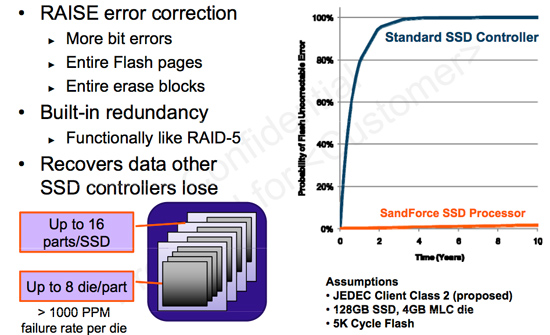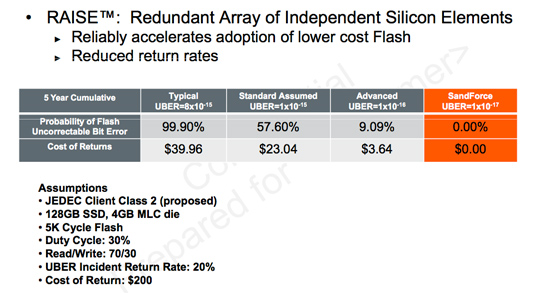Western Digital SiliconEdge Blue Review: WD Enters the Consumer SSD Market
by Anand Lal Shimpi on March 3, 2010 12:00 AM EST- Posted in
- Storage
Scrambling Data to Improve Reliability?
I secure erase all SSDs before I run any test, unless I'm testing used performance. On a modern SSD, performing an ATA Secure Erase takes anywhere from 30 - 50 seconds in most cases. The first time I went to secure erase the SiliconEdge Blue it took almost 17 minutes. I asked Western Digital what was going on, and got an interesting explanation.
The smaller NAND flash gets, the more prone the cells are to developing bit errors. That's why SandForce made such a big deal out of its controllers making 34nm possible thanks to extra error correction and redundancy.


SandForce's controllers attempt to fix bit errors in order to enable the use of cheaper MLC NAND
Western Digital found that writing certain combinations of data were more prone to generating these bit errors on smaller dimension flash (< 50nm). To prevent these sorts of errors from cropping up, the controller reorganizes (or scrambles) the data it's fed before writing it to the flash. When you go back to read the data off the flash, it's unscrambled before sending it back to the host controller so you get the data you requested.
![]()
As a side effect, the controller can't simply perform a flash erase to zero out the contents of the drive. Instead the SiliconEdge Blue has to physically write (a F or 0) to every NAND flash cell on the drive itself, which takes some time. On the bright side, WD does this to improve data integrity (or more likely to use cheaper MLC NAND without sacrificing reliability). The only downside is that a secure erase, which you shouldn't need to do that often, will take a long time to complete.










64 Comments
View All Comments
ClownBaby - Wednesday, March 3, 2010 - link
ughh... It nice to see new entries into the market, and continually improving performance, but prices are still outrageous! When will we get some relief with truly affordable SSDs? In my mind, I'd like to see 60gb drives in the >$100 rangs.chrnochime - Wednesday, March 3, 2010 - link
I thought the mainstream OCZ 60GB is already going for ~130 after rebate?Regardless, I have more faith in WD with its entry into SSD than any other manufacturer, except perhaps Intel. They are one of the most reliable HDD manu, and I don't see this changing with their SSD.
hybrid2d4x4 - Wednesday, March 3, 2010 - link
Looks like yet another player in the SSD game, and despite the often cited `yay, more competition = lower prices` rhetoric, SSD`s are just not decreasing in price. Even at half the prices mentioned in the article, it wouldn`t be an improvement in value over what`s currently available... guess I`ll be sitting on the sidelines yet another year...The0ne - Monday, March 8, 2010 - link
Umm, you want competition so the MARKET could drive the prices down. Right now we have competition but the market isn't really there. As more and more consumers readily shell out hundreds of hard earn dollars for 60GB drives, the market will respond :)wwwcd - Wednesday, March 3, 2010 - link
many money for slow devicesiFX - Wednesday, March 3, 2010 - link
Not likeing Intel's business practices I tend to avoid their products which left OCZ which I haven't been impressed with ever. Now WD is here, an established and respected storage company. Might be time to switch to an SSD. =)TemjinGold - Wednesday, March 3, 2010 - link
Hmm... "it just works," seems insanely overpriced, and the body is silver in color. Now what does that remind you of? :Dmedi01 - Wednesday, March 3, 2010 - link
2$ per GB, vs 0,08$ per GB, that makes, what, one to 30?HobHayward - Wednesday, March 3, 2010 - link
If storage size is all you care about then, yes, SSD's make no sense.However looking at performance, if speed is what counts, under certain circumstances these drives can perform 2 orders of magnitude or more faster than a traditional hdd. That's worth many times the cost difference to some people.
zhopa1 - Wednesday, March 3, 2010 - link
>>However looking at performance, if speed is what counts, under certain circumstances these drives can perform 2 orders of magnitude or more faster than a traditional hdd. That's worth many times the cost difference to some people.So basically, some people value that sometimes, in some circumstances, some SSD drives are faster... there is no useful information in your post...